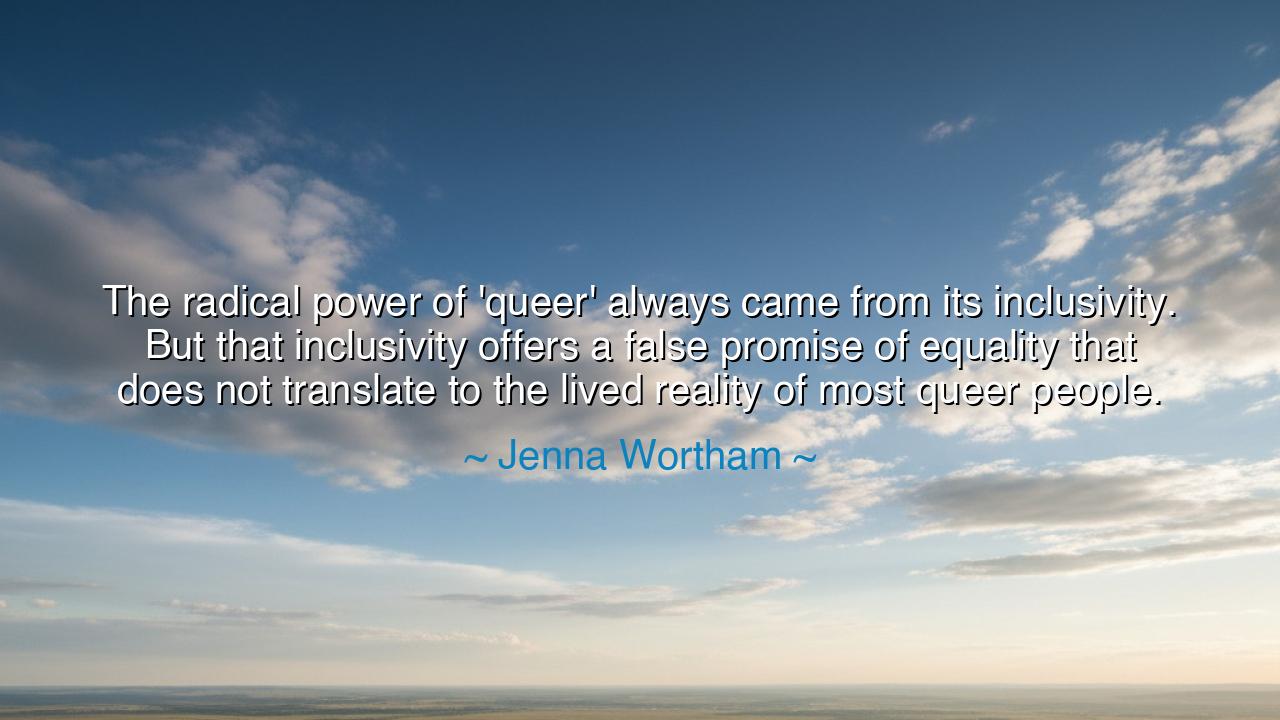
The radical power of 'queer' always came from its inclusivity.
The radical power of 'queer' always came from its inclusivity. But that inclusivity offers a false promise of equality that does not translate to the lived reality of most queer people.






In the long journey of human struggle for identity, freedom, and equality, there have been many battles fought on the shores of self-expression, and none has been more vivid, more complex, or more beautifully diverse than the fight for the queer community. The word queer, once an insult, now carries a banner of radical power—a power that rises from the embrace of all who fall outside the rigid bounds of convention, of gender, of sexual identity. It is an inclusive term, a word that holds within it the promise of belonging for all who are marginalized. Yet, as Jenna Wortham speaks with piercing insight, “The radical power of 'queer' always came from its inclusivity. But that inclusivity offers a false promise of equality that does not translate to the lived reality of most queer people.” This statement holds deep truths, revealing the distance between the vision of equality and the harsh realities of lived experience.
In times long past, the world’s great thinkers, those who challenged the status quo and dared to dream of a world where all could live freely, found that inclusivity was the root of their revolution. The ancient Greeks, who championed the beauty of the mind and the spirit, acknowledged many forms of love and expression beyond their conventional norms. Their gods and heroes were not limited to one expression of desire or identity. Similarly, the Radical Power of Queer emerges from this very embrace of diversity—the refusal to accept the boundaries drawn by society and instead to celebrate every form of love, every shade of identity. Queer is a banner under which all marginalized people—be they gay, lesbian, bisexual, transgender, or nonbinary—can stand united, saying, "We exist, and we are worthy."
However, as Jenna Wortham so wisely points out, there is a trap in this radical inclusivity. It promises a world of equality—but the reality is far from this ideal. The lived experience of many queer people, despite the promises of inclusion, is filled with struggles, violence, prejudice, and invisibility. To speak of inclusivity is to call for a community where all are welcome, but to live it is to confront the walls that are built from fear, misunderstanding, and long-held social norms. Just as the Civil Rights Movement in the United States demanded equality for Black people, yet fell short of delivering it to many, so too does the promise of a queer utopia often fail to reach the most marginalized within its ranks—transgender individuals, queer people of color, and those whose expressions fall outside the traditional spectrum of gender and sexuality.
Let us look to the Stonewall Riots, a turning point in queer history, where a rebellion sparked by a moment of resistance gave rise to a new era of visibility for the LGBTQ+ community. But even within this moment of triumph, exclusion existed. The faces of the brave individuals who threw stones at the Stonewall Inn were not all white and gay, but when the stories were told, they often focused on the experiences of cisgender, white men. Marsha P. Johnson, a Black transgender woman, and Sylvia Rivera, a Puerto Rican transgender activist, were two of the pivotal figures in these riots—yet, their contributions were too often overlooked in the narrative that followed. Inclusivity was not fully realized, even in its moment of greatest power. This false promise of equality shows us that while the term queer has the potential to unite, it also risks leaving behind those most vulnerable within the community.
The lesson here, O Children of the Future, is not one of despair, but of awareness. We must acknowledge that equality is not a given simply because we speak of it, and inclusivity must be more than an abstract ideal. It must be lived in every action, in every interaction, and in every policy. It is not enough to call ourselves inclusive; we must act inclusively by ensuring that those whose voices are the faintest are lifted highest. Whether through the struggles of transgender individuals, the queer people of color whose lives are often doubly oppressed, or those whose identities are less recognized or understood, we must commit to true equality—not the kind of equality that simply wraps everyone in a nice, neat bow, but one that acknowledges the complexity and the multiplicity of human identity and experience.
So, O Children of the Future, take this wisdom with you: To fight for true equality is to fight for the marginalized. Do not rest on the laurels of an inclusive language or a popular cause; instead, dismantle the systems that perpetuate inequality. It is your duty to ensure that the dream of inclusivity is not a promise left unfulfilled, but a reality that embraces all—not just those who are easiest to accept, but those whose very existence challenges the norms of society. Embrace complexity. Embrace difference. And above all, stand with those whose voices are least heard, for it is in lifting them that we shall create a world worthy of the radical power of queer.






AAdministratorAdministrator
Welcome, honored guests. Please leave a comment, we will respond soon